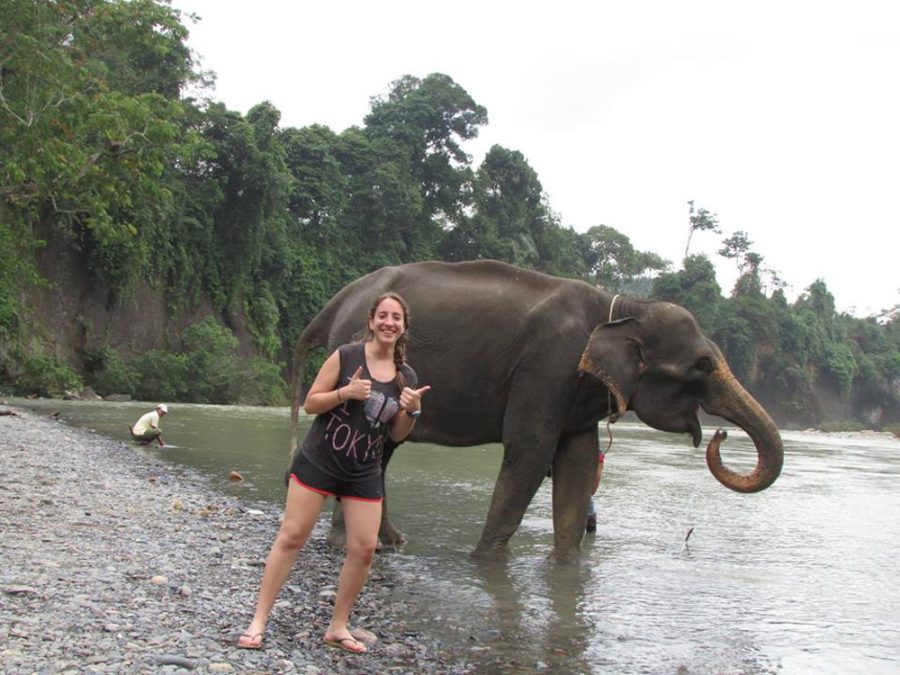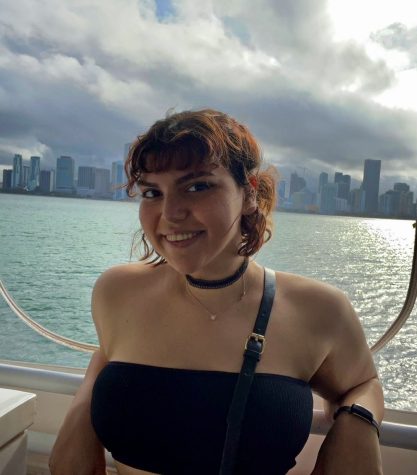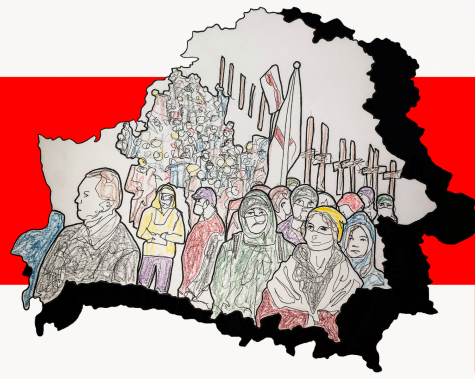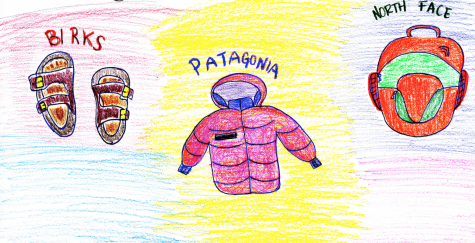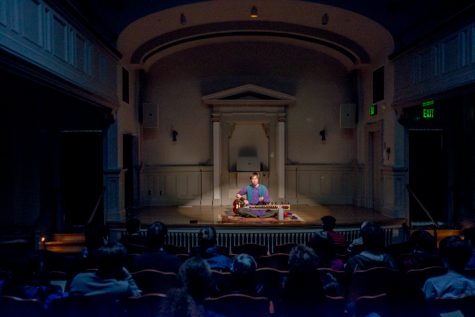United World Colleges: “The School of Life”
April 5, 2018
When American students enter their third year of high school, many opt for the International Baccalaureate (IB) Diploma Programme, an advanced program with an international focus that lasts two years, smattered with creativity, activity and service (CAS) and culminating in a 4000 word extended essay, a mini-thesis of sorts.
Internationally, many students enroll in the IB program by means of United World Colleges (UWC), a global education system that makes education “a force to unite people, nations and culture for peace and a sustainable future,” according to the UWC website.
With its IB curriculum, UWC schools are scattered across the world — in 17 countries on four continents. UWC’s 17 schools offer an international education to over 9500 16-19 years old each year, according to its website.
UWC believes that “education can bring together young people from all backgrounds on the basis of their shared humanity, to engage with the possibility of social change through courageous action, personal example and selfless leadership,” according to their website, and is deliberately diverse.
Faye Liu ’20, Yana Miakshyla ’21 and Lola Albarral Bravo ’20 all chose to go to a UWC schools for these very reasons — Liu went to UWC Atlantic College in Wales, United Kingdom; Miakshyla went to UWC Dilijan, Armenia; and Albarral Bravo went to UWC Southeast Asia, Singapore.
UWC ATLANTIC COLLEGE
Liu said that in her experience, “the mission was just using education as a medium to bring people together, studying together and working together to see a more sustainable and peaceful future.”
“I want to get to know different cultures. I want to put myself there even though it’s going to be very uncomfortable; I still want that change and get out of that comfort zone,” she said.
The selection process to get there was rigorous.
Liu, who was living in Wales at the time of applying, explained that there were two days of interviews followed by activities so that the selection committee could get to know each individual person.
“What kind of stuff are you interested in? Are you engaged in what’s happening in the world? Do you have an ability to work in a team?” Liu said.
Liu said that in one interview, there were fifty applicants who were split up into groups to engage in various activities. Alumni were mixed in and the selection committee observed how well they could work as a team.
Once accepted, Liu moved onto the grounds of a twelfth-century castle—her new campus.
The house that Liu lived in consisted of about 40 people, she said, and they quickly became close.
She lived with three roommates who each got their own corner of the room. One was from the Netherlands, one was from America and one was from all over, but had a French-American passport.
“Which is like, such a time. It’s like Jewett on another level. It’s very stimulating of like constantly surrounding yourself by people,” said Liu.
The bonding became heightened as there was no Wi-Fi in public spaces in the dorms—there was only Wi-Fi in the classroom and study rooms.
“If you have Wi-Fi, you gotta be on your phone all the time, and you’re just connecting to this other world,” said Liu. “That made me really aware to set this boundary between myself and technology.”
“That really brought us together in a way. We’re just always together. We do stuff together. We really bonded and talked, and go everywhere together,” she added.
Liu added that a big component of UWC was pushing students to not “flash your wealth.” The UWC website said “education should be independent of the student’s socioeconomic means,” so 70 percent of students are granted full or partial financial assistance. UWC students are cognizant of the fact that people come from very diverse backgrounds and not everyone will have an iPhone or a MacBook.
“Thinking about it back then, I think I’m just more critical of that at Whitman right now. There will be people that will be like, ‘Oh, put down your phone,’” said Liu. “It’s a super diverse environment … people are coming from all sorts of different upbringings that the school didn’t want people to feel uncomfortable not possessing a MacBook or something.”
In addition to socializing, Liu attended class from 8 a.m. to 1:30 p.m. everyday. In addition to class, the UWC education in Wales consisted of four faculties: environmental, global, social justice and outdoor.
Liu explained that a student is in one faculty for the entirety of their UWC experience, engaging in service throughout their two years. She said that the social justice and global groups went to local high schools and elementary schools in town to do service as a group. The social justice group would also go into prisons to hang out with the families of the inmates. The outdoor group would engage in outdoor activities, like surfing, as well as help build rescue boats for refugees in Turkey and Greece, said Liu. Liu was in the global group, so she went to local elementary schools to teach them about geography.
Oftentimes, she would talk to 12 and 13 year olds about immigration and refugees in classrooms, which really opened her eyes to the politics of conservative Wales.
“I was pretty shocked when I was talking to them about immigration because they’re so young and they don’t really have their political value yet, but by seeing the TV, the media and what their parents talk about, hearing young kids and talking about really mean stuff about immigrants like ‘Oh, they’re taking our jobs!’” said Liu. “Which makes sense because if you’re living in that environment, the only thing that you hear is from your parents or from the TV — it’s not going to be nice.”
To combat the ignorance of these kids that the UWC students were faced with, UWC students brought in refugees from Syria and Vienna to have them talk to the kids face-to-face, giving them a means in which to learn about these issues from the people experiencing them.
“It’s so easy to have an aggressive opinion on something if you can’t see a face or a real person in front of you and feel actually close enough to connect with him or her,” Liu said. “It’s so easy to be like, ‘Oh, I hear about this thing and this country, and it’s not right, and I just don’t want to go there.’ That’s the reason why I really like doing services.”
It was moments like these where Liu’s eyes were opened to how different people could really be, both inside and outside school. Liu explained that tolerating and understanding others and their perspectives is extremely important because people come from different backgrounds that lead them to believe different things.
“It means nothing to them when you say, ‘You’re being racist; you’re being sexist,’ because the word means so much to us because we’re being educated in that way; that is the worst thing you could do. But [for them] it’s more about tolerance or finding a middle ground, and communicating with each other,” Liu said. “I say what I got most from UWC is how to be a good listener, how to listen to [where] other people come from, and not to reject the whole person if you agree fundamentally on an issue, which is really important because they’re really intelligent and engaged people.”
UWC DILIJAN
First-year Yana Miakshyla calls UWC “a school of life.”
Miakshyla applied to the “school of life” from her home country of Belarus. Her application consisted of two components: an essay and a live interview. Once accepted to the next portion of the application process, Miakshyla had to go to the capital of Belarus to talk to the selection committee, where they made an effort to understand the candidates “not only as students, but also as individuals,” she said.
Miakshyla had to rank her top options: Norway, Armenia and Singapore. She ended up getting into UWC Dilijan in Armenia and said that she’s so happy she ended up there even though it was her second choice.
When Miakshyla stepped onto the UWC Dilijan campus, it was only a year old. There were around 180-200 students and 40 staff members spread out between two residence halls, one academic building, a dining hall, gym and medical center.
As part of her IB program, Miakshyla and her peers took three subjects on a higher level and three subjects on a standard level in addition to a philosophy-esque class called “Theory of Knowledge.” Miakshyla explained that there are six different spheres ones can choose to study in: Natural Sciences, Arts, Language A, Language B, Humanities and Mathematics. Miakshyla took Higher Level Mathematics, Economics, English Language and Literature. She took Biology, Spanish and Music on the standard level track.
In addition to academics, the IB program requires that every student participate in CAS — Community, Action and Service.
“It was a wonderful opportunity not only to connect with Armenia as a country in ways that could actually benefit it, but also to learn about your own strengths, areas for growths, patience and many other aspects of an independent learner,” Miakshyla said.
Miakshyla engaged in bee-keeping, skiing, dancing, horse-riding, working with kindergarten kids, piano, working with kids with disabilities, organizing fundraising for and building of UWC Dilijan’s own greenhouse and more through CAS during her two years at UWC.
In the midst of all the academic enrichment Miakshyla was experiencing, she still asserts that her favorite part of UWC was the people.
“The social life was vibrant,” she said. “I got to know people who come from 73 different countries and made friendships that last up to now. I spent nights in deep conversations and stressed about a 4000 word primary research paper called Extended Essay.”
The academics were rigorous. Miakshyla said that the most difficult part of her UWC experience was balancing that with the social life.
“Yet, I do not think that it is possible to perfectly balance these two things,” Miakshyla said. “It is all about the choices we make, and it is important to realize what you are pursuing by coming to this school. Everyone who is selected is used to being the best in their class. Yet, now everyone who surrounds them is the best. Am I pursuing academic perfection? Am I pursuing meaningful and life-changing relationships? Everything is mixed together, and it is up to me to make those little and significant choices every day, and then learn from the choices that appear to have been wrong in a specific situation.”
Miakshyla also said that the transition from home was drastic. In Belarus, she had to take 17 different subjects, but at UWC, she only had to take six. However, she emphasized that the academics were not easier at UWC as they were layered with depth and now in English. However, Miakshyla said that teachers were very understanding as they knew not everyone would not be perfect at writing essays right away, especially in English.
“English was terrifying for me!” Miakshyla said. “The first person who I met at 3 a.m. in the airport when I arrived came from Great Britain. Even though at school back home I was ‘the best’ at English, I couldn’t understand a word!” Miakshyla said.
“But, with time, I started adopting to different accents and expressing myself more freely, acknowledging the fact that I cannot improve my conversational English without making mistakes – so why should I worry about them?” she added.
While she learned a lot of English, Miakshyla said that the biggest thing she learned at UWC was everything she learned about herself.
“Learning does not necessarily happen in classrooms. I believe that one can learn from everything and everyone that surrounds them,” Miakshyla said. “I met people who changed me in a way that I would never think of. I, just like everyone else, went through triumphs and failures, and learned that I am valuable and unique just the way I am.”
UWC SOUTHEAST ASIA
Lola Albarral Bravo’s experience at UWC Southeast Asia in Singapore ventured slightly away from the traditional UWC experience. Both Liu and Albarral Bravo said that the UWC in Singapore operates more like an international school than a UWC school, hosting mainly wealthy students from Singapore.
Still, her education operated under the same UWC ideology.
“United World College is more like an ideology to provide students to develop critical thinking and peace building,” Albarral Bravo said.
Albarral Bravo, who is originally from Málaga, Spain, applied for UWC through the Spanish National Committee. She applied online, which was followed by a group interview, project presentation and final interview. Her project honed in on environmental education.
Albarral Bravo applied to UWCs in Costa Rica, Canada and India, but they placed her in Singapore because the UWC school in Singapore has had experiences with deaf students before, which would theoretically have suited Albarral Bravo’s needs.
However, Albarral Bravo said that there were no resources in the UWC classrooms in Singapore for her; Whitman has given her so many more resources.
UWC did give her good financial resources in the form of scholarships from the Davis foundation, affiliated with UWC, however.
“I really wanted to get a scholarship because I was afraid I would not ensure my academic potential,” Albarral Bravo said. “I wanted to go to UWC.”
Albarral Bravo was also drawn to UWC because she wasn’t getting a great English education in Spain.
“I really wanted to live to learn English and travel,” she said.
“UWC was important to me because it gave me a lot of opportunity. If I didn’t get the scholarship, I would not have the same level of English that I have now.”
Albarral Bravo said that at UWC, people were very aware of the difficulty of English and tried to speak it often. Some people weren’t so great at it, but improved with practice.
Albarral Bravo said that speaking English at Whitman is a different story.
“If you didn’t know very good English, it did not mean that you will not have friendships. Here [at Whitman], if you don’t know very good English, maybe it would be harder to have friendships. Because for me, with the Spanish accent, sometimes people stand back or don’t answer me,” Albarral Bravo said.
“Here, if I speak, people automatically will label me as a foreign person,” she added. “The UWC was not like that. I am not foreign. I am just part of a community. But here, no, I am foreign.”
Albarral Bravo remarked that moving from UWC to the United States was a hard adjustment because the United States simply isn’t as international as Europe.
“UWC students need to live in an international place with people from around the world because they already talk about politics; how to improve the world.”
No matter which UWC one comes from, whether it be Signapore, Dilijan or Wales, one thing is clear: UWC students strive to engage with people of all backgrounds, working to promote social change through collaboration and understanding. These are values that UWC alumna carry all the way across the world with them, all the way to Whitman.



